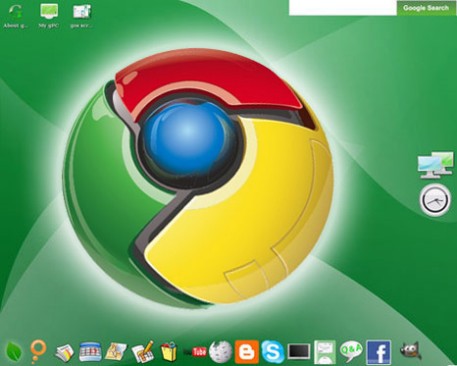Desktop Vendors Not Keen on Using Chrome OS
Unnamed vendors have said that Google needs to provide more resources and support if it's serious about Chrome OS on desktops.
DigiTimes reports that desktop PC vendors seemingly turned their nose up at Google's Chrome OS during executive chairman Eric Schmidt's speech in Taiwan on Wednesday. He was reportedly promoting Chrome OS as a high-profile option to Windows 7 and Ubuntu, focusing on the software's fast boot time, a lack of virus issues and the fact that it will be offered free of charge. He urged vendors to give Chrome OS a try.
But unnamed vendors on Wednesday said that if Google really wants to cut into the PC sector, then it will need to provide more resources and support than it has with the current crop of Chromebooks. As it stands now, there has been very little demand for Chromebooks since Acer and Samsung launched their versions back in June. The former company reportedly only sold 5,000 units by the end of July, and the latter Samsung was said to have sold even less than that in the same timeframe.
According to the unnamed vendors, the problem Chrome OS faces is that it's still too idealized. Consumers and businesses have yet to fully embrace cloud computing, storing documents and media locally on their physical drives. Popular applications are just now shifting over into the cloud by way of HTML5, but most highly-used and long-standing applications like Microsoft Office and Adobe Creative Suite are still installed locally and used offline.
The vendors also indicated that Google is mainly pushing Chromebooks in the enterprise market, yet its cloud-based Google Docs applications doesn't meet the needs of enterprise users. On a consumer front, Chromebooks become problematic for users who have a poor connection to the internet, or don't have a connection at all -- the "lite" cloud-based advantage suddenly becomes a huge disadvantage.
That said, it's no surprise that vendors aren't too keen on using Chrome OS as a major desktop platform. While many services and applications are indeed moving up into the cloud, the majority of the enterprise and consumer base hasn't quite shifted away from physical media even though cloud computing is the "trend of the future."
Get Tom's Hardware's best news and in-depth reviews, straight to your inbox.

Kevin Parrish has over a decade of experience as a writer, editor, and product tester. His work focused on computer hardware, networking equipment, smartphones, tablets, gaming consoles, and other internet-connected devices. His work has appeared in Tom's Hardware, Tom's Guide, Maximum PC, Digital Trends, Android Authority, How-To Geek, Lifewire, and others.
-
desktop's not so much, it might be a good choice for net tops or lightweight all in one computers.Reply
-
phatboe Before Google pushes out Chrome OS they need to lobby to the wireless/Big Telephone companies to lower their their 3G/4G bandwidth prices. Right now Verizon is charging $30 for a measly 2GB/month connection even over LTE. I would assume that since a cloud based OS such as Chrome OS would likely eat through those limits very quickly.Reply
I am not necessarily suggesting going back to unlimited data bandwidth (although that would be nice) but 2GB a month for $30 is way over priced. -
phatboe otacon72"lack of virus issues"...um because Chrome OS doesn't run anything of importance and it has maybe .01% market share. If Linux can't muster more than .1% share who on earth thinks Chrome OS will ever be mainstream.Reply
Yeah, lets forget about 90% of the worlds supercomputers and the millions of websites and servers which run Linux. Lets also forget about Android which is based on Linux and is the most used consumer mobile OS ahead of both WinMo7 and iOS combined. Yeah Linux will never be mainstream. -
ozzy702 phatboeYeah, lets forget about 90% of the worlds supercomputers and the millions of websites and servers which run Linux. Lets also forget about Android which is based on Linux and is the most used consumer mobile OS ahead of both WinMo7 and iOS combined. Yeah Linux will never be mainstream.Reply
Agreed, linux wonderful for what it is and is everywhere... EXCEPT the desktop PC market. A huge hurtle is DirectX. Microsoft did a wonderful job of locking down the gaming market with dirextX, they're good at business. -
fulle So, you make a lighweight Linux distribution, and then give it the gimmick that most of it's applications are stored up on the cloud. Everyone hates it. Casual users hate it, power users hate it, home users, enterprise uses. It's like universally hated... it's hated so much, that it's actually impressive how much it's hated. A couple desktop venders try it out for giggles, and they sell hardly any units because the idea just sucks.Reply
What do? -
JOSHSKORN For now, the cloud is a waste of time, particularly with phone companies charging so damn much for data. If it's going to work AT ALL, we NEED AFFORDABLE unlimited plans.Reply -
andy_newton Reminds me of an old familiar OS. I just forgot what it is. Let me think for a while... Oh yeah!!!Reply
Mac OS X
Sure looks like Mac OS X. -
drwho1 chumlySeriously, I don't want cloud. What's mine is mine.Reply
This is indeed the bottom line.
I will never switch from saving/accessing my programs or files to some cloud who knows where.
I prefer to have them on my own hard drive.
Need a copy of X or Y?
That's what backups are for.
-
burnley14 I tried using their Chromium OS a while back but it was over my head, I couldn't even figure out how to install it. Hopefully this Chrome OS is a little more friendly to the tech enthusiast, and not just the tech professional. If so, I'd totally give it a try on an old laptop. May breathe some new life into it, who knows?Reply
